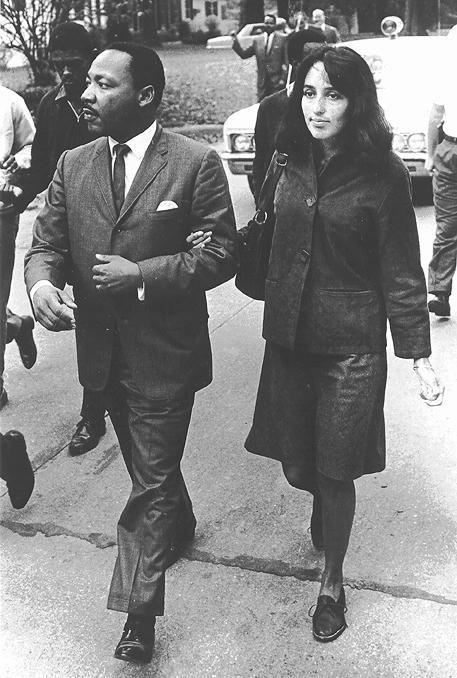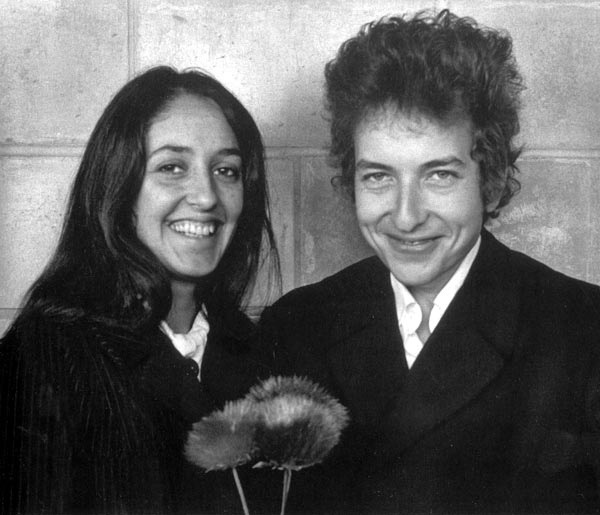
Joan sings The Beatles, “Let It Be”:
* * * * *

1966: Martin Luther King and singer Joan Baez marching to the Grenada, Mississippi school that was being integrated. Baez supported the effort financially. ©1976 Bob Fitch/Take Stock / The Image Works.
* * * *
* * * * *
Joan and Bob, together,
(listen to her album of Dylan songs):




* * * * *
OTHER FULL ALBUMS:
* * * * *
FULL CONCERTS
* * * * *
 Joan sings some classic Marley ragga…
Joan sings some classic Marley ragga…
And why not trip on with caliente Cuban
“Guantanamera!”
* * * * *
Artist Biography by William Ruhlmann
Joan Baez – The most accomplished interpretive folksinger of the 1960s, Joan Baez has influenced nearly every aspect of popular music in a career still going strong. Baez is possessed of a once-in-a-lifetime soprano, which, since the late ’50s, she has put in the service of folk and pop music as well as a variety of political causes. Starting out in Boston, Baez first gained recognition at the 1959 Newport Folk Festival, then cut her debut album, Joan Baez (October 1960), for Vanguard Records. It was made up of 13 traditional songs, some of them children’s ballads, given near-definitive treatment. A moderate success on release, the album took off after the breakthrough of Joan Baez, Vol. 2 (September 1961), and both albums became huge hits, as did Baez’s third album, Joan Baez in Concert, Pt. 1 (September 1962). Each album went gold and stayed in the bestseller charts more than two years.
Joan Baez in Concert, Pt. 2 From 1962 to 1964, Baez was the popular face of folk music, headlining festivals and concert tours and singing at political events, including the August 1963 March on Washington. During this period, she began to champion the work of folk songwriter Bob Dylan, and gradually her repertoire moved from traditional material toward the socially conscious work of the emerging generation of ’60s artists like him. Her albums of this period were Joan Baez in Concert, Pt. 2 (November 1963) and Joan Baez 5 (October 1964), which contained her cover of Phil Ochs’ “There But for Fortune,” a Top Ten hit in the U.K.
Farewell, Angelina Like other popular folk performers, Baez was affected by the changes in popular music wrought by the appearance of the Beatles in the U.S. in 1964 and Dylan’s introduction of folk-rock in 1965, and she began to augment her simple acoustic guitar backing with other instruments, initially on Farewell, Angelina (October 1965). It was followed by a Christmas album, Noël (October 1966), and Joan (August 1967), albums on which she was accompanied by an orchestra conducted by Peter Schickele. Baez continued to experiment in the late ’60s, releasing Baptism (June 1968), in which she recited poetry, and Any Day Now (December 1968), a double album of Dylan songs done with country backing, which went gold… READ ON AT AMG ALL MUSIC GUIDE
* * * * *
RECOMMENDED FURTHER READING:
“In his study, Markus Jaeger explores the coalescence of Joan Baez’s work as a singer and songwriter with her endeavors as a political activist throughout the last fifty years. He illustrates an American popular singer’s significance as a political activist–for her audiences and for her opponents as well as for those victims of politically organized violence who have profited from her work. Mingling popular culture with political activism can be a helpful means to achieve non-violent societal progress. Joan Baez’s work offers an excellent example for this hypothesis.” DOWNLOAD EBOOK IN PDF FROM LIBGEN.ORG (230 pgs, 2010)
* * * * *
* * * * *
Gran Finale:
BBC’s Imagine // Joan Baez











